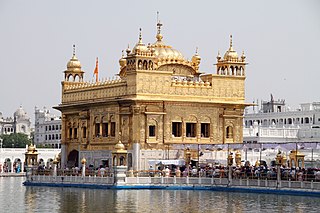
Sikhism, also known as Sikhi, is an Indian religion and philosophy that originated in the Punjab region of the Indian subcontinent around the end of the 15th century CE. It is one of the most recently founded major religions and among the largest in the world with about 25–30 million adherents.

Guru Angad was the second of the ten Sikh gurus of Sikhism. After meeting Guru Nanak, the founder of Sikhism, becoming a Sikh, and serving and working with Nanak for many years, Nanak gave Lehna the name Angad, and chose Angad as the second Sikh Guru.

Guru Amar Das, sometimes spelled as Guru Amardas, was the third of the Ten Gurus of Sikhism and became Sikh Guru on 26 March 1552 at age 73.
Dev, devs, or DEV may refer to:
Sandeep or Sundeep is a common Indian given name. The name may be derived either from the Sanskrit saṃdīpa, referring to a burning flame or lamp, or from the name of Sandipani, the guru of Krishna.

The Sikh gurus are the spiritual masters of Sikhism, who established the religion over the course of about two and a half centuries, beginning in 1469. The year 1469 marks the birth of Guru Nanak, the founder of Sikhism. He was succeeded by nine other human gurus until, in 1708, the Guruship was finally passed on by the tenth guru to the holy Sikh scripture, Guru Granth Sahib, which is now considered the living Guru by the followers of the Sikh faith.
Aulakh is a Jat clan in the Punjab region of India and Pakistan.

Goindwal, also known as Goindwal Sahib and alternatively transliterated as Goindval, is located in the Taran Taran district of the Majha region of Punjab, India about 23 km (14 mi) from Tarn Taran Sahib. In the 16th century it became an important center for the Sikh religion during the Guruship of the Guru Amar Das Ji. Goindwal is on the banks of the Beas River and is one of the focal points of small scale industries of Tarn Taran district.
Das is a common last name in South Asia, among adherents of Hinduism and Sikhism, as well as those who converted to Islam or Christianity. It is a derived from the Sanskrit word Dasa meaning servant, devotee, or votary. "Das" may be inferred to be one who has surrendered to God. The surname is often used by those in the Vaishnav community.
Vaisakh is the second month in the Nanakshahi calendar and the Punjabi calendar.
Randhawa is a Jat clan found in the Punjab region of India and Pakistan. The Randhawa name has special significance in the history of the Sikh faith, the first appointed Granthi was a Randhawa There are also adherents of Hinduism and Islam belonging to the Randhawa clan.

Kartarpur is a town located, just 102 km from Lahore city in the Shakargarh Tehsil, Narowal District in Punjab, Pakistan. Located on the right bank of the Ravi River, it is said to have been founded by the first guru of Sikhism, Guru Nanak, where he established the first Sikh commune.

Angad Singh Bedi is an Indian actor and former model. He made his debut with Kaya Taran in 2004, an adaptation of a Malayalam short story by N. S. Madhavan, Vanmarangal Veezhumpol . He has acted in the film F.A.L.T.U in 2011 and known for his roles in Pink (2016), Dear Zindagi (2016) and Tiger Zinda Hai (2017).
Bava is a surname that can either be of Italian or Indian origin. The Italian surname originates from a nickname meaning 'dribble slime', while the Indian surname is a variant of Bawa, a Sikh name borne by the male descendants of the first three Sikh gurus.
Events from the year 1552 in India.
Chand means Moon in Hindi.
Arjun is an Indian male given name, which means lustrous, shiny white, color of the lightning; of the milk; of silver; made of silver. It is also the name of the Arjun tree due to its silvery bark; Name of lndra, and of the third of the Pandava prince

Balvand Rai also spelt as Balwand and Rai Balvand, was a poet mystic and rabab player in the court of Guru Arjan.
Sandhu or Sindhu is the second largest clan of Jats in the Punjab region of India and Pakistan. The Sandhus played an important role in the Sikh history. During the period of the Sikh Confederacy, Sandhus ruled several sovereign states (misls) including the Nakai Misl, Shaheedan Misl and the Kanhaiya Misl.
Trehan is a Punjabi Khatri surname.







